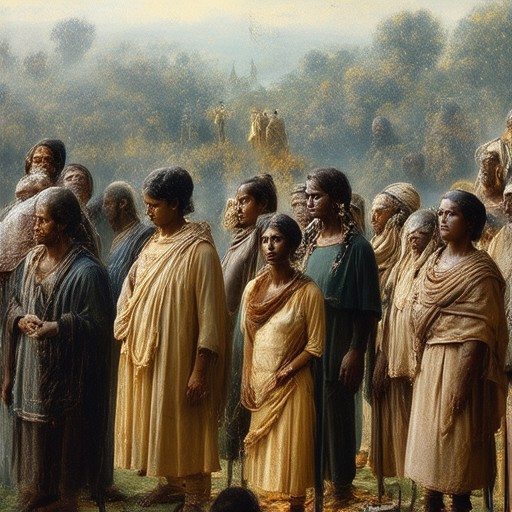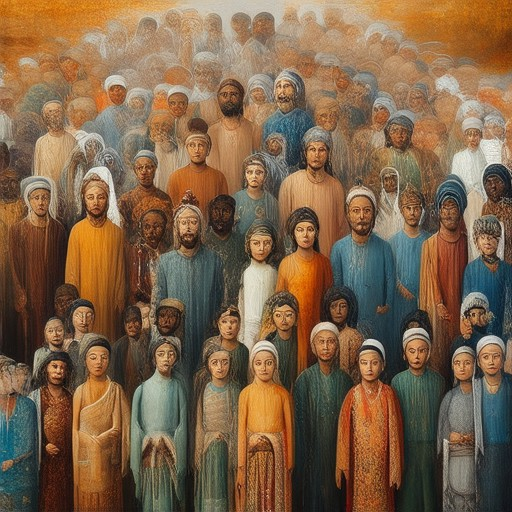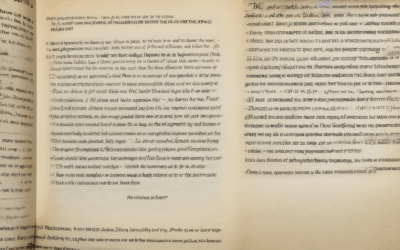Exploring the intricate layers of humanity, we delve into the profound question of what authentic reflections on humanity truly mean. From the evolution of human thought to the complexities of human nature, this journey uncovers the essence of who we are and how we perceive ourselves. By examining historical perspectives, diverse viewpoints, and the influence of culture, we aim to reveal the true essence of humanity. This exploration touches on empathy, growth, and the dynamic interplay between individuality and connection, offering genuine insights into the nature of being human. As we traverse this path, we uncover the transformative power of authenticity, both within and across generations, and reflect on the enduring quest to understand the true essence of humanity.

Authentic Reflections on Humanity
Humanity is a complex tapestry woven with emotions, thoughts, and experiences that define who we are. Reflecting on humanity involves delving into the depths of our collective consciousness, understanding the motivations that drive us, and appreciating the diversity of perspectives that shape our world.
Emotional Complexity
At its core, humanity is driven by a vast spectrum of emotions. Love, anger, joy, sorrow, and fear are just a few of the feelings that resonate across cultures and generations. These emotions are what connect us, making us capable of profound acts of kindness and compassion, as well as moments of great conflict and struggle.
- Love binds families and communities together
- Anger can lead to division or inspire change
- Joy brings happiness and hope
- Sorrow unites people in shared grief
- Fear shapes decisions and actions
Intellectual Curiosity
Humanity’s intellectual curiosity has led to remarkable advancements in science, art, philosophy, and technology. Our ability to question, explore, and seek knowledge has pushed boundaries and expanded our understanding of the universe and our place within it.
- Science explores the mysteries of the cosmos
- Art expresses the human spirit
- Philosophy contemplates existence
- Technology reshapes daily life
Social Interconnectedness
Humans are inherently social beings, forming relationships, communities, and societies that govern how we live. Our interconnectedness drives innovation, cultural exchange, and collective progress, while also presenting challenges such as inequality and conflict.
- Relationships strengthen individual lives
- Communities support mutual growth
- Societies establish rules and norms
- Cultural exchange fosters understanding
Moral Responsibility
Reflecting on humanity also involves considering our moral responsibilities. We are tasked with ethical decision-making, protecting the vulnerable, and working toward a more equitable world. These responsibilities guide our actions and shape the legacy we leave behind.
- Ethical choices impact future generations
- Protecting the vulnerable is a shared duty
- Advocating for equity requires ongoing effort
- Moral progress is a collective journey
Existential Wonder
The question of humanity’s purpose and meaning sparks existential wonder. This reflection often leads individuals to seek purpose, find meaning, and understand their role in the grand scheme of existence. It is this curiosity that has inspired countless works of literature, music, and philosophy.
- Purpose drives personal and collective goals
- Meaning provides direction and fulfillment
- Existential questions inspire deeper thinking
- Cultural heritage shapes identity
Final Thoughts
Reflecting on humanity reminds us of our shared vulnerabilities and strengths. It challenges us to embrace our potential for growth and to strive for a better world. As we continue to explore and understand ourselves, we uncover the true essence of what it means to be human.
Explore more reflections and stories on Peter Spirito , where personal storytelling meets thoughtful insight.
What Are Some Authentic Insights Into the Nature of Humanity?
Here are five authentic insights into the nature of humanity, exploring our unique qualities and shared characteristics:
- Evolutionary Origins : Humanity’s nature is deeply rooted in our evolutionary history. Our ancestors adapted to survive in diverse environments, developing traits like empathy, cooperation, and innovation. These traits have shaped who we are today, driving our ability to thrive as a species.
- Emotional Complexity : Humans possess a vast array of emotions, ranging from joy and love to fear and sadness. Our emotional depth allows us to connect with others on a deep level, forming relationships and communities.
- Cultural Diversity : No two humans share exactly the same culture, yet we all belong to one. Cultural differences reflect our adaptability and the infinite ways we can interpret and express what it means to be human.
- Behavioral Patterns : Consistent behavioral patterns reveal fundamental aspects of our nature. From learning through observation to seeking comfort in routines, these patterns highlight our capacity for growth and adaptation.
- Future-Oriented Thinking : Our ability to think about the future, plan for tomorrow, and imagine possibilities sets us apart. This forward-thinking mindset has driven technological advancements and societal progress.
These insights remind us that while humanity shares common ground, each individual and culture carves out a unique path in understanding and expressing our shared humanity.

What Are Genuine Perspectives on the Essence of Humanity?
Exploring the essence of humanity involves delving into diverse viewpoints and deeper insights into what defines us as humans. Our shared experiences and unique identities shape who we are, offering a rich tapestry of perspectives to consider.
From a philosophical standpoint, humanity is often seen as a complex interplay of emotions, thoughts, and behaviors driven by consciousness and self-awareness. Philosophers have long debated the nature of the human condition, questioning whether we are inherently good, inherently evil, or a combination of both. This duality is reflected in literature, art, and cultural narratives that explore the depths of the human soul.
Scientifically, humanity is understood through the lens of biology, psychology, and sociology. These fields examine how we evolved, how our brains function, and how social structures influence our behavior. Advances in neuroscience have revealed the complexity of the human mind, while sociological studies have uncovered patterns in how societies organize themselves.
Art and literature offer perhaps the most vivid expressions of humanity’s essence. Through stories, paintings, and music, artists capture the full spectrum of human emotion—from love and joy to sorrow and despair. These creations serve as windows into the human condition, showing how individuals navigate life’s challenges and celebrate its beauty.
Religion and spirituality further enrich our understanding of humanity. Different faiths propose various origins for humanity, offering beliefs about our purpose and potential. These perspectives often emphasize compassion, empathy, and ethical behavior, encouraging individuals to live lives aligned with universal principles.
Modern discussions on humanity’s essence often focus on themes like interconnectedness, diversity, and resilience. We live in a world where global challenges require collective action, highlighting our shared responsibility to one another. At the same time, advancements in technology raise questions about the future of humanity and our role in the universe.
Ultimately, the essence of humanity lies in our ability to reflect, grow, and adapt. By embracing both our similarities and differences, we can better understand ourselves and work toward a more inclusive and compassionate world.
For more insights into the human experience, visit our Peter Spirito blog, where we explore personal storytelling and creative reflections on life’s journey.

Reflecting on the Nature of Humanity
To authentically reflect on the nature of humanity, consider exploring perspectives that blend introspection, empathy, and intellectual curiosity. Here are some approaches:
- Personal Journeys : Document your own experiences and observations to gain deeper insights into human behavior and emotions. This can involve journaling, storytelling, or sharing personal anecdotes.
- Philosophical Inquiry : Study philosophical texts that delve into human nature, such as works by Aristotle, Socrates, or existentialist thinkers like Sartre. These writings often provide rich frameworks for understanding humanity.
- Cultural Exploration : Investigate how different cultures perceive human nature. By studying diverse traditions and belief systems, you can uncover unique insights into what it means to be human.
- Artistic Expression : Engage with art, literature, and music to explore humanity’s collective consciousness. Artists often capture complex emotions and societal truths that are difficult to articulate otherwise.
- Scientific Insights : Look into psychological studies, evolutionary biology, and social sciences to understand human behavior from a scientific perspective. This can offer a more objective view of human nature.
- Community Engagement : Participate in discussions or groups where people share their thoughts on humanity. This can provide exposure to varied viewpoints and foster a richer understanding.
- Ethical Consideration : Reflect on ethical dilemmas and moral questions to grapple with the complexities of human existence. This can include issues like justice, equality, and the meaning of life.
- Historical Context : Examine historical events and figures to see how humanity has evolved over time. Understanding past challenges and achievements can offer lessons for the present.
- Cognitive Exercises : Practice mindfulness or meditation to observe your own thoughts and reactions. This can help you better understand your place within the broader spectrum of human experience.
- Collaborative Learning : Engage with others who have similar interests. Collaborative learning environments can spark new ideas and deepen your understanding of humanity’s shared qualities.
By combining these approaches, you can develop a multifaceted perspective on the nature of humanity, one that is both personal and universal.
The True Essence of Humanity
Exploring the depths of humanity reveals a complex tapestry woven with emotions, thoughts, and experiences that define our existence. To truly understand what makes us human, we must delve into the core attributes that set us apart from other species and connect us as a collective.
- Emotional Intelligence: Our ability to recognize, understand, and manage our own emotions, as well as empathize with others, is a hallmark of humanity. This trait allows us to form relationships, solve problems, and navigate life’s challenges with nuance and depth.
- Empathy and Compassion: The capacity to share feelings with others and respond with compassion is a fundamental aspect of our nature. It drives acts of kindness, support, and mutual understanding, fostering connections between individuals and communities.
- Resilience and Adaptability: Throughout history, humans have demonstrated remarkable resilience in the face of adversity. Our ability to adapt to changing circumstances, learn from mistakes, and persevere through challenges defines our spirit and drives progress.
- Curiosity and Creativity: The inherent desire to explore, discover, and innovate is what has propelled humanity forward. Whether through scientific advancements, artistic expressions, or technological innovations, our creativity shapes the world we live in.
- Interconnectedness: Humans are inherently social beings who thrive in groups. Our ability to communicate, collaborate, and form bonds creates networks that support survival and enhance quality of life.
- Moral and Ethical Frameworks: The development of ethical principles and moral codes has guided human behavior and shaped societies. These frameworks help us navigate complex situations and decide right from wrong, fostering trust and cooperation among individuals.
- Cultural Diversity: Our rich array of cultures, traditions, and beliefs highlights the vast spectrum of human potential. Each culture offers unique perspectives and practices, enriching our collective understanding of existence.
- Pursuit of Meaning and Purpose: The quest for purpose drives many aspects of human life. Whether through personal goals, religious beliefs, or contributions to society, we seek to find meaning and leave a lasting impact on the world.
- Social Bonds and Relationships: The foundation of human society lies in our ability to form strong, meaningful relationships. These bonds provide emotional support, economic stability, and a sense of belonging that are essential to our well-being.
- Balance Between Individuality and Community: Humanity’s strength lies in its ability to balance personal aspirations with collective goals. This equilibrium allows us to thrive as individuals while contributing to the greater good of our communities and society.
Understanding these traits and qualities helps us appreciate the complexity and richness of what it means to be human. By embracing and nurturing these aspects, we can work toward creating a more compassionate, resilient, and thriving world.

Understanding Authentic Reflections on Humanity
Authentic reflections on humanity are rooted in a combination of introspection, empathy, and self-awareness. These elements work together to foster a genuine understanding of ourselves and others, enabling deeper connections and meaningful insights into the human experience.
- Introspection : This is the process of examining one’s own thoughts, feelings, and experiences. By reflecting inward, we gain insight into our own nature, which forms the basis for understanding others. Without introspection, it becomes challenging to approach others with authenticity.
- Empathy : This is the ability to share the feelings of others. Empathy builds on introspection by allowing us to connect with the emotions and experiences of those around us. It enables us to see beyond our own perspectives and appreciate the diversity of human existence.
- Self-Awareness : Recognizing our own emotions, strengths, and limitations is crucial for authenticity. Self-awareness ensures that our reflections are grounded in reality and that we remain honest in our interactions with others.
These three elements—introspection, empathy, and self-awareness—create a dynamic interplay that enriches our understanding of humanity. They allow us to explore the complexities of being human, fostering meaningful relationships and a deeper appreciation for life’s diversity.
By cultivating these qualities, we can engage in authentic reflections on humanity, uncovering truths that resonate universally.




0 Comments